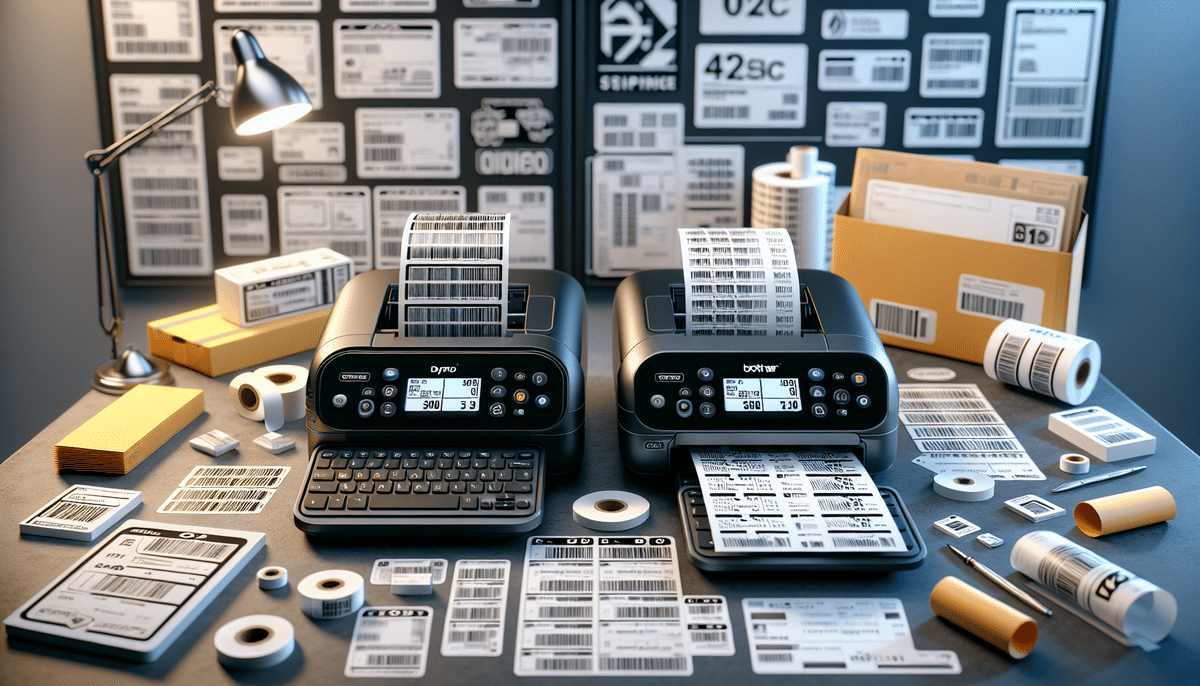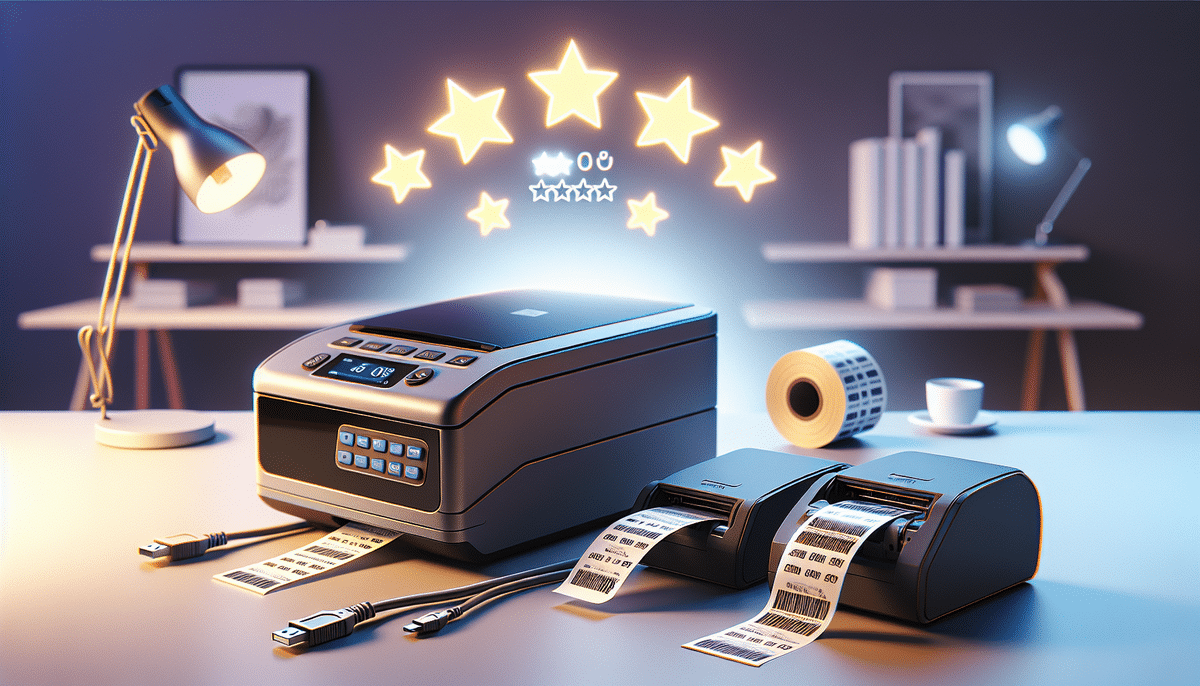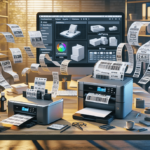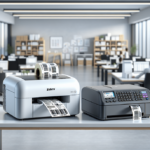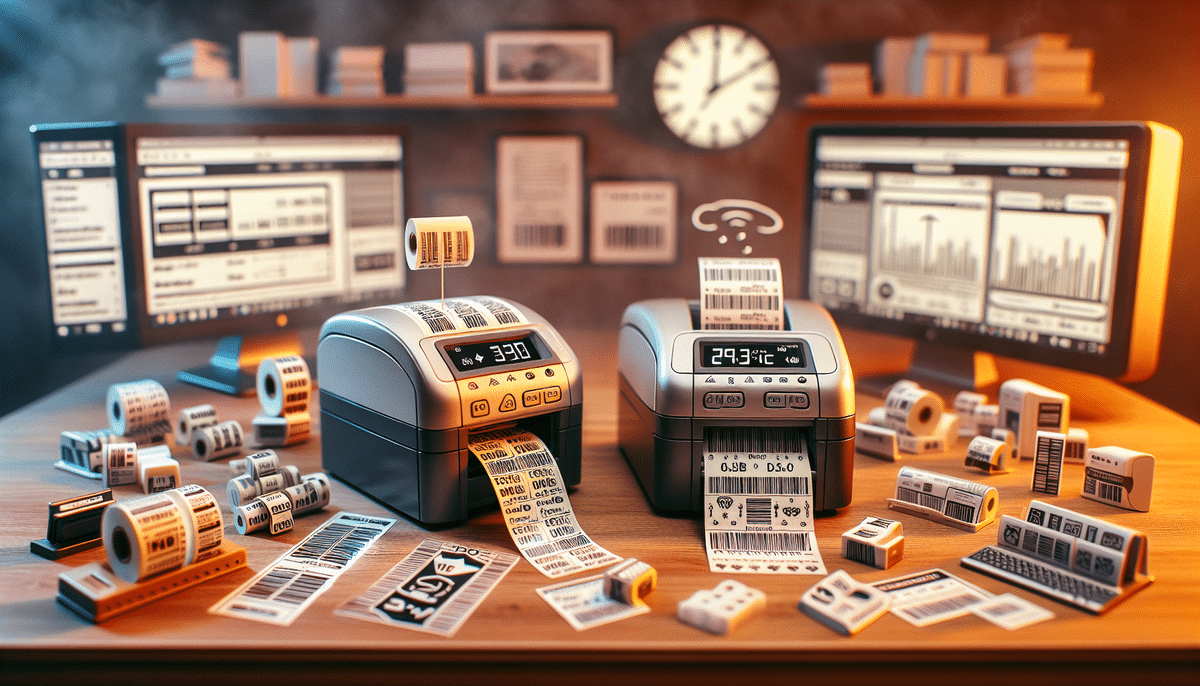Introduction to Label Printers
Label printers have become indispensable tools for businesses across various industries, enabling efficient printing of barcode labels, address labels, shipping labels, and more. Among the top contenders in the market are the DYMO LabelWriter 450 Turbo and the Brother QL-1100. This comprehensive comparison delves into their features, specifications, design, print quality, speed, connectivity options, software compatibility, and pricing to help you determine which label printer best suits your business needs.
Why Choose a Label Printer?
Label printers offer unparalleled efficiency and convenience for businesses that regularly handle large volumes of labeling tasks. Whether you’re managing inventory in a warehouse, operating a retail store, or handling office logistics, label printers streamline the process of creating custom labels with precision and speed.
- Enhances Organization: Facilitates easy identification and tracking of products and packages.
- Boosts Brand Image: Allows incorporation of custom designs and logos onto labels.
- Cost-Effective: Reduces the need for traditional printing methods, saving on ink and paper.
According to a Statista report, the global label printer market is projected to grow significantly, underscoring the increasing reliance on these devices in modern businesses.
Key Features and Specifications
DYMO LabelWriter 450 Turbo
- Print Speed: Up to 71 labels per minute
- Maximum Label Width: 2.4 inches
- Print Resolution: 600 x 300 dpi
- Connectivity: USB, Wireless via DYMO Connect app
- Label Capacity: Up to 71 labels per roll
- Additional Features: Automatic label peeler, prints USPS-approved postage (requires subscription)
Brother QL-1100
- Print Speed: Up to 69 labels per minute
- Maximum Label Width: 4 inches
- Print Resolution: 300 x 600 dpi
- Connectivity: USB, Ethernet, Wireless (Wi-Fi and Bluetooth)
- Label Capacity: Up to 300 labels per roll
- Additional Features: Automatic label cutter, integrates with Microsoft Office Suite
Design and Build Quality
The DYMO LabelWriter 450 Turbo boasts a compact and sleek design, measuring 2.8 x 5.5 x 7.6 inches and weighing just 1.4 pounds. Its minimalist aesthetic ensures it fits seamlessly into any desktop environment without occupying much space.
In contrast, the Brother QL-1100 is slightly larger and heavier, with dimensions of 5.0 x 9.3 x 6.0 inches and a weight of 4.8 pounds. It features a modern design complemented by a large LCD screen that displays label information and printer settings, enhancing user interaction and control.
Both printers are built with durability in mind, ensuring they can withstand the rigors of daily use in busy office settings.
Print Quality and Speed
Print quality and speed are critical factors when selecting a label printer. The DYMO LabelWriter 450 Turbo offers a higher print resolution of 600 x 300 dpi, resulting in sharper and more detailed labels. This is particularly beneficial for printing small fonts and intricate graphics.
On the other hand, the Brother QL-1100 provides a resolution of 300 x 600 dpi, which is still sufficient for most labeling needs but may not offer the same level of detail as the DYMO. However, both printers deliver clear and crisp prints that meet industry standards.
In terms of speed, the DYMO LabelWriter 450 Turbo is marginally faster, printing up to 71 labels per minute compared to the Brother QL-1100’s 69 labels per minute. While the difference is minimal, it can significantly impact productivity in environments where large volumes of labels are printed regularly.
Connectivity Options
Connectivity is essential for integrating label printers into your existing workflow. The DYMO LabelWriter 450 Turbo connects via USB and supports wireless printing through the DYMO Connect app, enabling printing from mobile devices or tablets.
The Brother QL-1100 offers more versatile connectivity options, including USB, Ethernet, Wi-Fi, and Bluetooth. This flexibility allows it to be easily integrated into a variety of network setups and accessed from multiple devices, making it a more adaptable choice for larger or more dynamic work environments.
Software Compatibility
Both printers come with dedicated software that enhances their functionality:
DYMO Label Software
The DYMO Label Software is user-friendly and comes with a variety of templates and design options. It allows users to import graphics and logos, customize label layouts, and integrate with popular applications like Microsoft Word, Excel, and Outlook.
Brother P-touch Editor
The Brother QL-1100 uses the P-touch Editor software, which offers extensive design capabilities, including barcode creation, image and logo integration, and compatibility with the Microsoft Office Suite. This software provides users with powerful tools to create professional and customized labels efficiently.
Pricing and Value
When it comes to pricing, the DYMO LabelWriter 450 Turbo is generally more affordable, with retail prices ranging from $130 to $150. It also includes a two-year limited warranty, providing assurance of its quality and durability.
The Brother QL-1100 is priced slightly higher, typically between $200 and $250. However, the additional cost is justified by its larger label capacity, automatic cutter, and more extensive connectivity options. For businesses that require these added features, the Brother QL-1100 offers greater value despite the higher initial investment.
Pros and Cons
DYMO LabelWriter 450 Turbo
Pros:
- High-speed printing up to 71 labels per minute
- Superior print resolution of 600 x 300 dpi
- Compact and lightweight design
- Wireless connectivity via DYMO Connect app
Cons:
- Smaller label capacity compared to Brother QL-1100
- Limited connectivity options (no Ethernet or Bluetooth)
- Basic label design software compared to competitors
Brother QL-1100
Pros:
- Supports larger label widths up to 4 inches
- Higher label capacity with up to 300 labels per roll
- Multiple connectivity options including Ethernet and Bluetooth
- Advanced label design software with extensive customization
Cons:
- Higher price point compared to DYMO LabelWriter 450 Turbo
- Print resolution slightly lower at 300 x 600 dpi
- Heavier and larger footprint
Choosing the Right Label Printer for Your Needs
Deciding between the DYMO LabelWriter 450 Turbo and the Brother QL-1100 ultimately depends on your specific business requirements:
- Choose DYMO LabelWriter 450 Turbo if:
- You need a compact and affordable label printer with high-speed capabilities.
- Your labeling needs are moderate, and you don’t require large label widths or extensive connectivity options.
- Choose Brother QL-1100 if:
- You require the ability to print larger labels and have higher label volume needs.
- You need versatile connectivity options and advanced label design features.
Both printers are reliable and offer excellent performance, so consider the specific features that align with your business operations to make the best choice.
Conclusion: DYMO LabelWriter 450 Turbo vs Brother QL-1100
Selecting the right label printer is crucial for enhancing your business’s efficiency and productivity. The DYMO LabelWriter 450 Turbo excels in speed, print quality, and affordability, making it ideal for businesses with moderate labeling needs. Meanwhile, the Brother QL-1100 offers greater versatility with larger label capacities and more connectivity options, catering to businesses with higher demands and more complex labeling requirements.
By carefully evaluating your specific needs and considering the strengths and limitations of each printer, you can make an informed decision that will support your business’s labeling operations effectively.
For more detailed reviews and industry insights, refer to reputable sources such as PCMag, TechRadar, and CNET.















